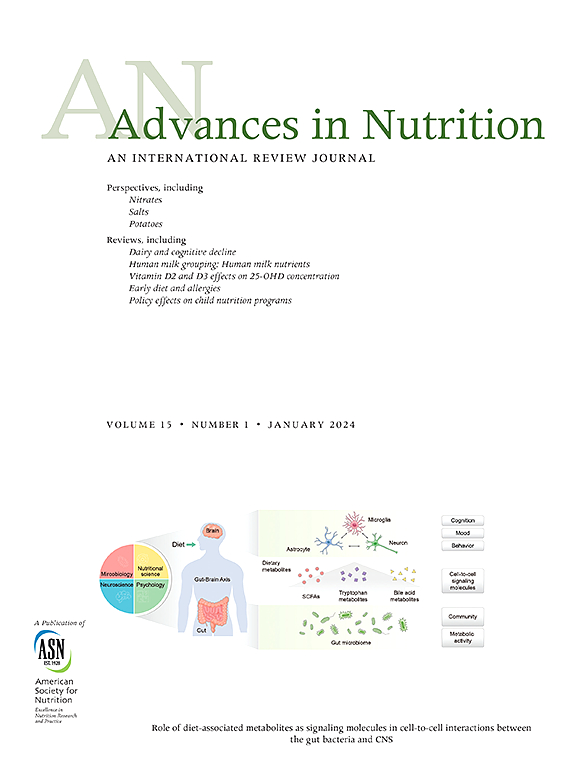The Effects of Aspartame on Glucose, Insulin, and Appetite-Regulating Hormone Responses in Humans: Systematic Review and Meta-Analyses
IF 9.2
1区 医学
Q1 NUTRITION & DIETETICS
引用次数: 0
Abstract
Aspartame (L-α-aspartyl-L-phenylalanine methyl ester) has been implicated in increased risk of several chronic health conditions, yet underlying mechanisms remain unclear. The objective of this work was to systematically identify and summarize all controlled intervention studies investigating the effects of aspartame consumption on glucose, insulin, and appetite-related hormone responses. Five academic databases, 4 trial registries, and additional resources were searched until June 2024. Search hits were screened, in duplicate, for intervention studies of aspartame compared with comparator, which assessed glucose, insulin, and/or any other appetite-regulating hormone. Results were tabulated, and meta-analyses run where ≥10 studies with similar methodology were found. Risk of bias (RoB) was assessed using RoB-2. Certainty of the evidence was assessed using Grading of Recommendations Assessment, Development, and Evaluation. One hundred one articles were identified, detailing 100 experiments: 79 acute (≤1 d), 8 medium term (2–30 d), and 13 long term (>30 d). Experiments involved healthy adults, individuals with aspartame sensitivity, and individuals with compromised glucose metabolism, varied widely in aspartame provision and comparator/s, and although almost all assessed glucose and/or insulin responses, few experiments investigated other appetite-regulating hormones. Meta-analyses (acute cross-over studies) revealed few effects of aspartame on blood glucose/insulin compared with vehicle or low-calorie sweeteners (LCS), and lower blood glucose/insulin concentrations compared with sugars, other carbohydrates, or other nutritive elements. Over the medium term and longterm, few effects of aspartame were found, and high heterogeneity between studies remained. Similar effects were found in other populations, and other outcomes, with few adverse events. RoB assessments suggested “some concerns” for the majority of studies. The certainty of the evidence for all outcomes in all populations was judged to be “very low.” Our findings suggest little to no effects of aspartame consumption on glucose metabolism over the short term or the long term. Further studies over the long term, assessing a range of appetite-regulating hormones and comparing aspartame with other LCS, would be of value.
This study was registered in PROSPERO as CRD42024540781 on April 29, 2024.
阿斯巴甜对人类葡萄糖、胰岛素和食欲调节激素反应的影响:系统回顾和荟萃分析。
背景:阿斯巴甜(L-α-天冬氨酸-L-苯丙氨酸甲酯)与几种慢性疾病的风险增加有关,但其潜在机制尚不清楚。目的:系统地识别和总结所有研究阿斯巴甜摄入对葡萄糖、胰岛素和食欲相关激素反应影响的对照干预研究。方法:截至2024年6月,检索了5个学术数据库、4个试验注册库和其他资源。对阿斯巴甜与对照物的干预研究进行了两份搜索结果筛选,评估了葡萄糖、胰岛素和/或任何其他食欲调节激素。将结果制成表格,并进行荟萃分析,其中发现≥10项采用类似方法的研究。使用rob2评估偏倚风险。使用GRADE评估证据的确定性。结果:鉴定出101篇文章,详细描述了100个实验:79个急性期(30天)。实验涉及健康成人、对阿斯巴甜敏感的个体和葡萄糖代谢受损的个体,在阿斯巴甜供应和比较物/s方面差异很大,虽然几乎所有实验都评估了葡萄糖和/或胰岛素的反应,但很少有实验研究其他食欲调节激素。荟萃分析(急性交叉研究)显示,与载体或低热量甜味剂(LCS)相比,阿斯巴甜对血糖/胰岛素的影响很小,与糖、其他碳水化合物或营养元素相比,阿斯巴甜对血糖/胰岛素的影响更低。从中长期来看,阿斯巴甜的影响很少,研究之间的异质性仍然很高。在其他人群和其他结果中发现了类似的效果,几乎没有不良事件。偏倚风险评估对大多数研究提出了“一些担忧”。所有人群中所有结果的证据的确定性被判定为“非常低”。结论:我们的研究结果表明,在短期或长期内,摄入阿斯巴甜对葡萄糖代谢几乎没有影响。长期的进一步研究,评估食欲调节激素的范围,并将阿斯巴甜与其他LCS进行比较,将是有价值的。协议注册:PROSPERO:CRD42024540781, 29.04.24。重要性说明:虽然摄入阿斯巴甜对健康的影响仍有争议,但这项工作确定了100个实验,研究了摄入阿斯巴甜对葡萄糖、胰岛素和其他食欲调节激素反应的影响。短期或长期服用阿斯巴甜几乎没有影响,也没有健康禁忌症。
本文章由计算机程序翻译,如有差异,请以英文原文为准。
求助全文
约1分钟内获得全文
求助全文
来源期刊

Advances in Nutrition
医学-营养学
CiteScore
17.40
自引率
2.20%
发文量
117
审稿时长
56 days
期刊介绍:
Advances in Nutrition (AN/Adv Nutr) publishes focused reviews on pivotal findings and recent research across all domains relevant to nutritional scientists and biomedical researchers. This encompasses nutrition-related research spanning biochemical, molecular, and genetic studies using experimental animal models, domestic animals, and human subjects. The journal also emphasizes clinical nutrition, epidemiology and public health, and nutrition education. Review articles concentrate on recent progress rather than broad historical developments.
In addition to review articles, AN includes Perspectives, Letters to the Editor, and supplements. Supplement proposals require pre-approval by the editor before submission. The journal features reports and position papers from the American Society for Nutrition, summaries of major government and foundation reports, and Nutrient Information briefs providing crucial details about dietary requirements, food sources, deficiencies, and other essential nutrient information. All submissions with scientific content undergo peer review by the Editors or their designees prior to acceptance for publication.
 求助内容:
求助内容: 应助结果提醒方式:
应助结果提醒方式:


